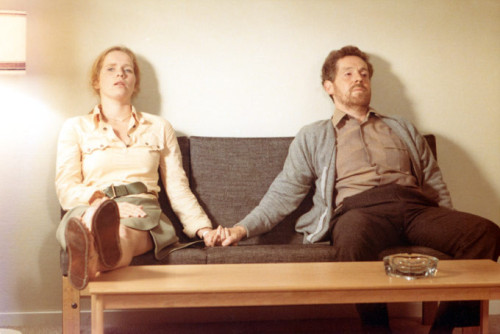Relationship Decay: How To Avoid And Deal With It

Human relationships aren't just a subject to write about in curiosity and feminine magazines, they are far more than that. Human relationships are one of the core things that makes us different then pretty much any other animals. The ways humans develop bonds, romantic or not, are at such a level of complexity that it puts us heads and shoulders over any kind of bond born out of instinct, entering the realm of complex emotions that not even the greatest philosophers where able to fully unravel.
For a long time, science ignored human relationships as a subject of study. Only with the advent of psychiatry did we turn our eyes to the great marvel that is human romance and relationships in general.
Faced with such complex beast, scientists desperately tried to come up with simple explanations for its enormous variety of nuances and manifestations. Sigmund Freud attempted to reduce relationships by depicting them as mere manifestations of the core human instinct of procreation, filtered through social and cultural norms and emotions. However, Freud was unable to confirm his claims, and his failure at conquering the mystery and nuances of human relationships is one of the factors that led to him being discredited later.

I could go on for ages talking about how society has looked at and studied human relationships throughout centuries, but this isn't what this article is about. This article is about relationship decay, helping you identify it and deal with it and, even possibly revert it!
This is not a one person hub by any means. In here I'll be using the opinions of hubbers which are experienced in this subject, and even academic writing.
With this trove of info, I've compiled and resumed a few ways of identifying and fighting relationship decay. But first, we need to actually know what exactly relationship decay is, and why it is an evil that afflicts such a great number of people.
What Is Relationship Decay?

Remember how you and your partner used to talk when you had just started dating? Everyone has their own differences, of course, but it often goes like this, for most people:
At first there is this small tension in the air. You wonder how your new partner sees and thinks of you. Does he/she think you are pretty? Is he/she interested in you because of your body? Is he/she charmed by your personality? Is this all the result of a really good first impression of you? What do you expect out of this new date? What do you think of your new partner? Is this what you really want? What are the consequences of this new relationship in your life?
These questions swirl around in your head, and you're most likely trying to be pleasant. This continues for a while, and eventually the tension drops. You're now in the most pleasurable phase of the young relationship. There is little tension, and you are now both truly enjoying each other. Maybe its not everything you thought or expected out of it, but its making you happy, and that is what matters.
This goes on for a long time. Months and even years can pass and you'll still be sure you made the right choice. There's a few bumps here and there, some fights maybe, some deceptions, but your relationship can handle it, and the happiness comes back, maybe even that initial, fresh happiness of a young relationship. If you (and your partner) are feeling like this, then great! You might as well skip the rest of the article.
Then one day, you start to notice that things have changed a lot, and maybe not for the better. Your partner seems colder and more distant. You two don't talk as often as you did anymore, or at least not about intimate things and feelings. Suddenly your partner's presence in your life start to become more a thing of routine rather then something to cherish.
Those compliments, shows of affection and such things don't seem to happen anymore. Those special dates of the year that you used to cherish with your partner have now become more of a hassle or a formality to deal with rather than something to look forward to. Sex had become less and less of an interest in both of you, and when it actually happens, its usually unsatisfying or unfulfilled. Your life becomes more about your job, your kids (if you have them) and maybe friendships, that one TV show you like, things you want to buy, etc; rather than your relationship, which is more like a background piece in your life, slowly gathering more and more dust.
If you're nodding at many of these things as you read the last paragraph, then you're likely experiencing relationship decay.

Relationship decay is a dangerous beast because it can creep on you and your partner undetected. In fact, a recent study published in the Psychological Science Journal of the University of Rochester has demonstrated that it can lay its seeds undetected and slowly corrode a relationship from within.
The study done by researchers from said university has shown that, while we do momentarily detect bad changes in the relationship (loss of affection, emotional moments, increased fighting, distancing, etc), we often end up unintentionally suppressing this knowledge, often because of an internal sense of loyalty to our partner, or a strong feeling of responsibility, in the sense that we refuse to believe the relationship is getting worse, and thus do nothing about it, either out of fear of what revealing these thoughts of decay may cause or even laziness in regards to dealing with the surfacing problems.
This very reluctance to deal with the problems and subsequent suppression is a symptom of relationship decay in itself!
The study also demonstrated that, by measuring the subconscious reactions of one partner in relation to another, it was possible to predict whether they would stay together or not.
Do you often feel annoyed when interacting with your partner? Do you feel negative emotions more often than positive ones when in relation to your partner? Are you at the point in which you're actually treasuring your nice moments together, because they're so few and so far apart in time by now?
Before we proceed, its important that you answer all these questions with yourself. And then you need to answer the most difficult question of all:
"Do I want to save my relationship?"
Do You Want To Save Your Relationship?

Hey, I know this question sounds ridiculous. If you're even reading this hub, you're sure you want to save it!
Or do you?
Just now we talked about how relationship decay can happen without you noticing it. Just like that, you may not actually know whether you're actually interested in saving your relationship.
Answer these question in your mind: in your most recent bad moment in your relationship, did you decide to just let things happen and not do anything about it, and then it eventually "fixed" by itself? Was it your partner who made the effort to solve said issue, while you pretty much did nothing but was relieved when it got solved?
Remember that you need to be honest to yourself. If you can't, you might as well stop reading this, since nothing contained here can help a person who's not honest to himself/herself.
If you answered yes, then you may not actually want to save your relationship. Maybe you gave up on it long ago and didn't notice it. Maybe your feelings for your partner are already dead, and you can't salvage something that is already gone.
However, if there is any little bit of love left, then it is worth saving.
Here's another way to answer the big question. For this, we'll be using the relationship investment model as proposed by Caryl E. Rusbult, published in the Journal of Personality And Social Psychology (available at the website of the American Psychological Association).
The relationship investment model basically proposed an equation for determining the quotient of happiness someone may be getting out of their relationship. Commitment to a relationship is a function of satisfaction with the relationship plus investments into the relationship minus the possible alternatives to the relationship.
In layman's words, is the amount of effort you're putting into your relationship much larger than the amount of happiness you're getting out of it? If yes, then you likely want to save your relationship.
If the amount of effort you're putting into your relationship is low but the satisfaction you're getting is also low, then you may be part of the problem, or even its cause!
Fellow hubber dashingscorpio offered her insight when answering my question on this subject, and his comment is right on point with this issue:
I believe it take effort to avoid relaxing and taking each other for granted. One adage is:
"We treat the (new) better than the (tried and true)."
This tends to happens whether it's a new job, new car, or new relationship. Early on we make it a point to do whatever we can maintain things at their highest level.
However as the years roll by we tend to "slack off".
In the beginning when he/she got their new car they told their friends/family: "No eating or drinking in my car." They had it washed & waxed every weekend along with getting detailed every six months. Three years later it looks like a grenade went off in it and the body has an inch of dirt.
When they got that new job they showed up to work 20 minutes early bright eyed and bushy tail ready to take on the day. Five years late they stroll in 20 minutes late and when a co-worker teases the about he/she says: "They're LUCKY I showed up!"
In the beginning of a new relationship people bend over backwards to be agreeable with someone whom they are infatuated with. The word "no" almost does not exist. Surprises, gifts, and cards are done "just because". An effort is made to look one's best, be positive, and encouraging. At the start of the relationship when a guy arrived at his girlfriend's home she asked him if he wanted something to eat.
Five years later he asks: "Would you make me a grilled ham and cheese sandwich?" Her reply: "You got two hands fix it yourself! I worked all day just like you!" You know where the refrigerator is...."
(...)
If you stop showing up for work you get fired, stop paying your mortgage you lose your home, stop paying your car note it's reprocessed, stop doing just about anything in life and you're bound to incur negative consequences.
A relationship is like a garden. If you fail to nurture it then it dies.
Note: A gardener doesn't call maintenance "work".
It's a "labor of love".
It's easier to maintain a fire than it is to reignite a spark!
You'll have to decide whether you want to save it or not. You don't have to answer these questions and use this model to determine what you want, but you'll have to decide before you keep reading.
If you decided you don't want to save it, then, well, can't help you here, at least not with this article.
If you decided you want to save your relationship, then read on to find out how!
More sources of advice
1 Recreating The Pleasant Mood And The Importance Of Flirting

When the relationship starts to decay, the flirty and sexual part of it is usually the first to go. Lack of sexual attraction can fade away for reasons other then emotional ones, however. After you reach a certain age, you'll likely have more physiological reasons rather than emotional ones for a lack of sex, and this doesn't mean that the other parts of the relationship (affection, mutual respect, loyalty, etc) will also fade away with it, but they'll get more vulnerable, for sure.
Now, I'm not telling that you go to your partner all of a sudden and go "HEY LETS HAVE SEX AHAHAHAH". Slow down, geez.
You'll want to slowly reconstruct the mood first. How's your appearance lately? Have you been polishing it, or did you think that commitment would give you an excuse to stop taking care of yourself?
Also, a common misconception is that women have more of an obligation to be attractive to their partners than men do. This is obviously wrong. A man has to also maintain his appearance in order to keep his partner interested.
Of course, looks aren't everything. People also have a tendency to stop talking affectionately and flirting regularly. This is a mistake, as flirting is also important in established relationships. This helps to communicate the idea that you desire to be your partner, and makes them feel loved and increases their self esteem, and low self esteem is one of the biggest causes of relationship problems as well as many other issues.
In this subject, fellow hubber savvydating has contributed greatly with her comment on the already mentioned question:
I once met a man who had been married five times. He told me that, “this time around,” he believes he “got it right.” He stated that he finally learned how important it is to buy his wife flowers. He said that simple little action made all the difference.
In relating this story, the point I am making is that a relationship will decay if we forget to do all the “sweet” little things we used to do when we first met. Just because time has passed and he or she has stuck around, that doesn’t mean we no longer have to do anything to keep the fire burning, so to speak. Even a steady ember is good and well in that it brings a certain comfort.
I would disagree with anyone who states that just because his wife gained twenty pounds, she’s now unfit to be his wife. “Non.” (As the French would say) This merely means she may be gaining weight due to her medication or that her husband needs to take her by the hand and say, “We’re going for a brisk walk honey.” “Come on, let’s hold hands.”
Same with women. She should do things to be pretty. Even a little thing like pulling her hair up on top of her head at the end of the day, and letting the tendrils fall around her face, shows her husband that she still cares about her appearance…
Also, we have to keep flirting. Flirting does wonders for the soul. Love and commitment should be as natural as breathing air. Anyway, you get the gist. We don’t have to become body builders or keep a steady supply of Viagra in the medicine cabinet. We just need to charm each other naturally. That is what keeps love alive. In time, this (romantic) habit becomes ingrained into the couples life….and they don’t have to worry about “decay.”
However, if couples take each other for granted or become too nit-picky, then resentment will cause the decay of the relationship.
2 Talk To Your Partner
The previous step served to reopen communication channels between you and your partner. Often times, just trying to talk about the issue will scare or put your partner on guard in regards to you, and maybe even make them think you want to end the relationship when you're trying to save it!
However, after a good dosage of affection (maybe even some sex), he/she will likely be far more open to a talk about these issues.
Your relationship isn't only yours, its also your partner's, and as such it cannot be saved without an effort from both parts.
First, choose a nice moment to talk, preferably personally, unless that is somehow impossible. A moment in which your partner is relaxed and has time to spare is best.
Start by talking about how you came to the conclusion your relationship was getting worse and how you want don't want to lose it. Tell them how much you love them, and that you want to bring back the best in both of you, for both of you. Tell them how important they are to you and about what you're willing to do in order to save your relationship.
In a more general sense, open your heart to your partner. Tell him everything you've been willing to say but didn't. Tell him/her about the things you like and dislike about the relationship, their person, their habits, their acquaintances, their job, their family, and ask him/her what he/she thinks about you.
These are just general guidelines. The person who knows your partner best is you, so it is you who should decide how to bring this up in conversation. Just remember to be honest to yourself, because you can't be honest to your partner if you lie to yourself.
3 "The Little Things"

"The little things" is a term people use to describe those little acts and shows of affection couples will do in order to express their feelings to their partner. A whole lot of couples stop worrying about these small acts after the relationship establishes itself, and this is a big mistake.
To put things into perspective, when was the last time you and your partner went out to just have a walk and enjoy some time together, just the two of you? When was the last time your partner talked about wanting something from the fridge, and you went there yourself and got it for him/her? When was the last time you told your partner that you love him/her?
If these things don't seem important to you, then you are terribly wrong. These little, almost random acts of affectionate kindness toward your partner are important to maintaining and nurturing that general feeling of happiness and satisfaction one gets from a good relationship. With every little act, the feelings you have for each other are reinforced and reinvigorated.
Loving someone with all your heart is good, but if your partner doesn't know it, it wont help with anything. This doesn't mean you should be constantly showering your partner with gifts and sugary compliments or acts, but this doesn't mean you should completely neglect to do so either.
Pay attention to your partner. When he/she mentions wanting or desiring something, try to acquire it for them. Make it a surprise, even if its something as trivial as a cup of water. If there anything in specific they've been wanting for a while but couldn't get it? Is there any possibility you could get it for him/her? Of course, this doesn't mean you should go incredibly out of your way and capacity to give your partner a gift, but sometimes there are things you are perfectly able to do in their benefit, and you just don't notice because you aren't paying attention.
4 Do Not Isolate Yourself - Seek Help

Sometimes, you have to back away a bit in order to appreciate the true features of a picture. Just like that, a person outside your relationship may be able to better observe and identify the issues affecting it.
No, this doesn't mean you should talk to strangers about your relationship issues, much less be unfaithful to your partner. What I mean is that you can ask a person you trust a lot to look at your relationship and try to identify what is going on.
Often, people who are suffering from relationship decay seek the advice of a close relative, such as their mother. Mothers do have a special knack for this sort of thing, but sometimes this can cause more problems then you expected to solve!
Remember, you should only seek help from people who you deeply trust and that want you AND your partner to be happy. Opening your heart to and asking for help from someone that does not have you and your partner's happiness in their best interests can be an easy way to destroy whatever is left of your relationship, so choose wisely.
Additionally, you can try consulting a professional counselor or a psychiatrist. Couple therapy has helped an enormous amount of people since its inception. However, this isn't something you can decide for yourself, as you'll have to talk to your partner about it, since without their participation, the counseling won't be effective at identifying or solving any problems.
5 Are You Part Of The Problem? Be Ready To Make Sacrifices

Sometimes, most of the problems in the relationship may be born out of your own actions, without you even noticing it. This is where the previous step comes in handy. It is easier to spot a speck in another's eye then it is to notice a beam in your own, after all.
If you notice your actions and habits are being the source of the problems in your relationship, well, you have to decide what you'll let go off, your relationship or your habits. But since you already decided to save your relationship, then its time to make sacrifices.
Can you live without said habit? Is your habit a problem? Will the quality of your life greatly diminish if you sacrifice it? Does your partner partake in your habit? What kept you from stopping what you are doing when you noticed it is damaging your relationship? Does your partner know the full extent of it?
These are questions only you can answer, and that only you can decide over. But always remember: do not isolate yourself. Human beings are not loners, we should ask others for help when we cannot help ourselves.









